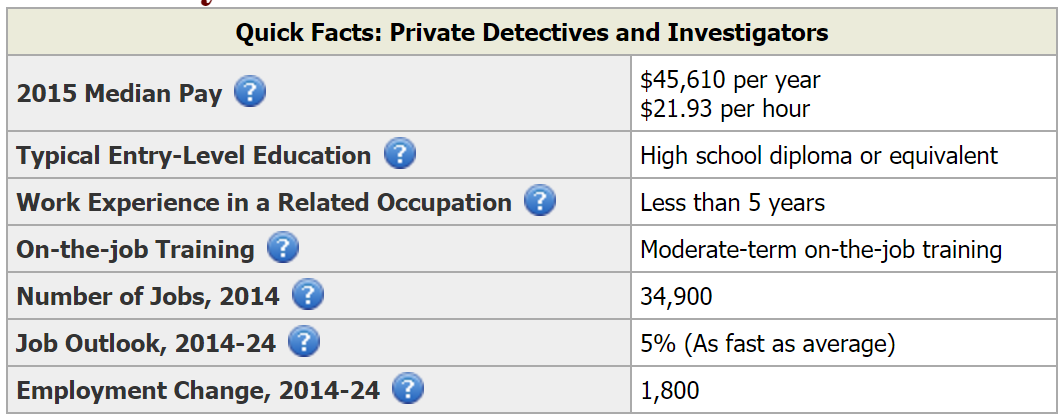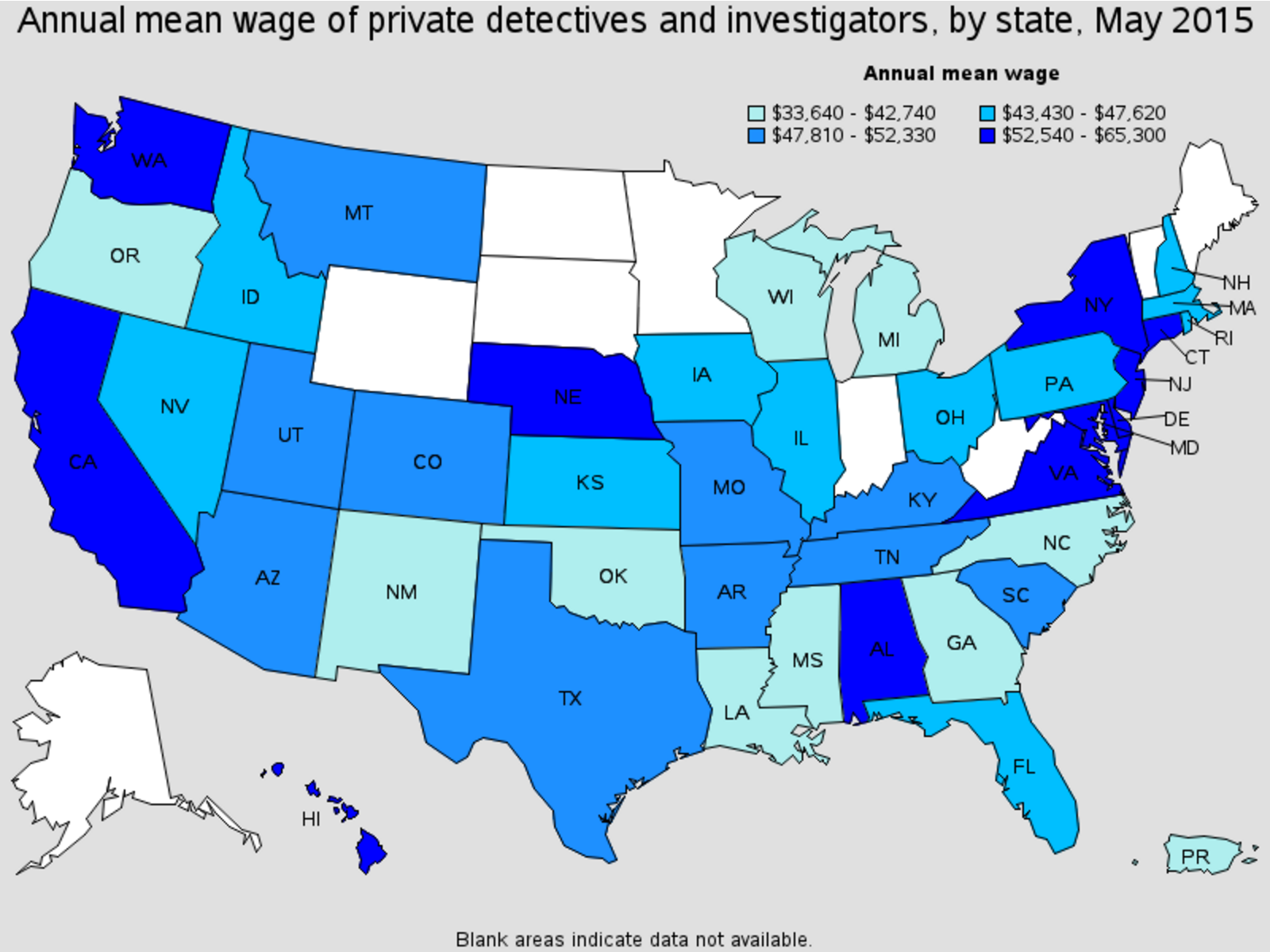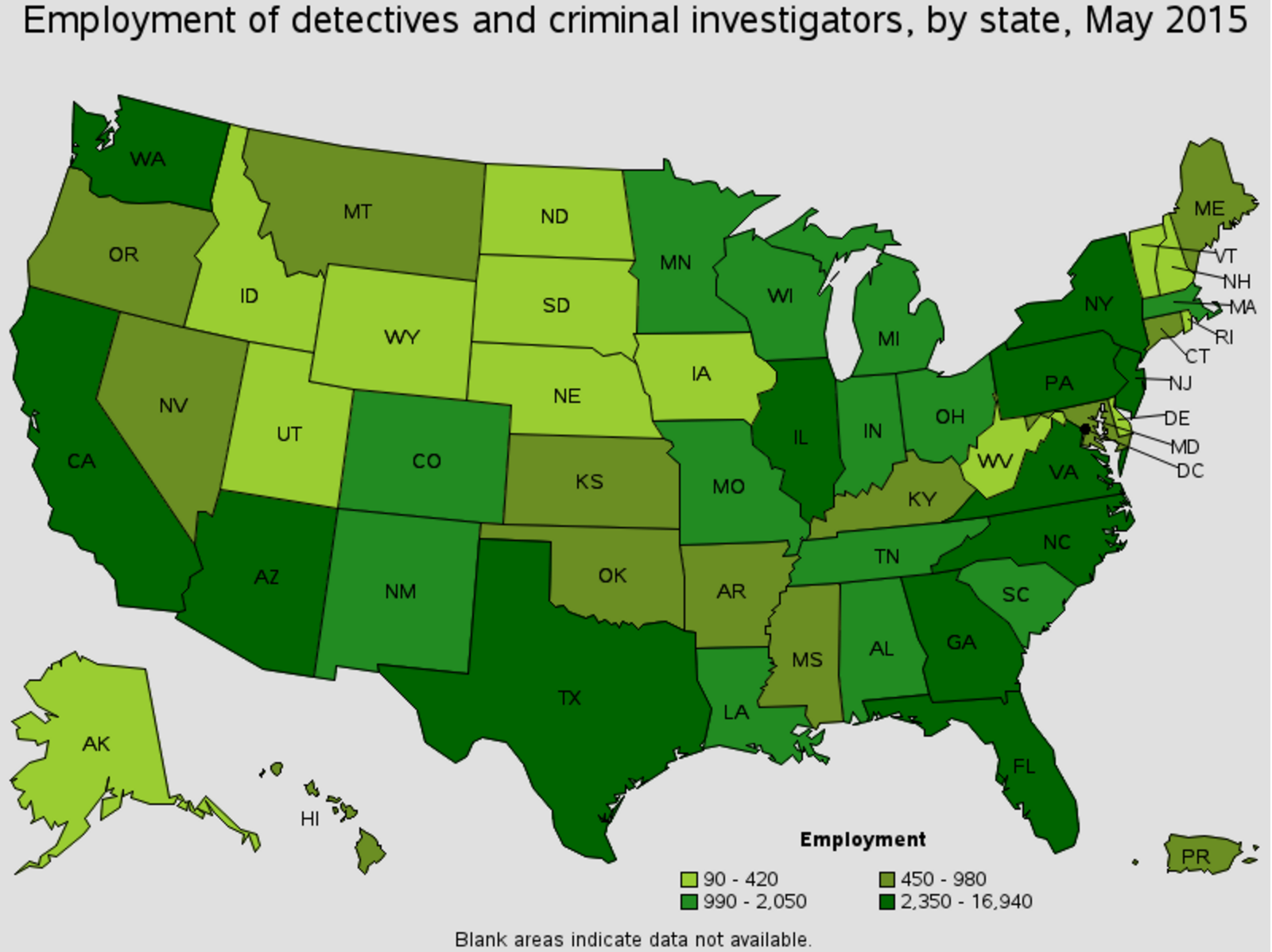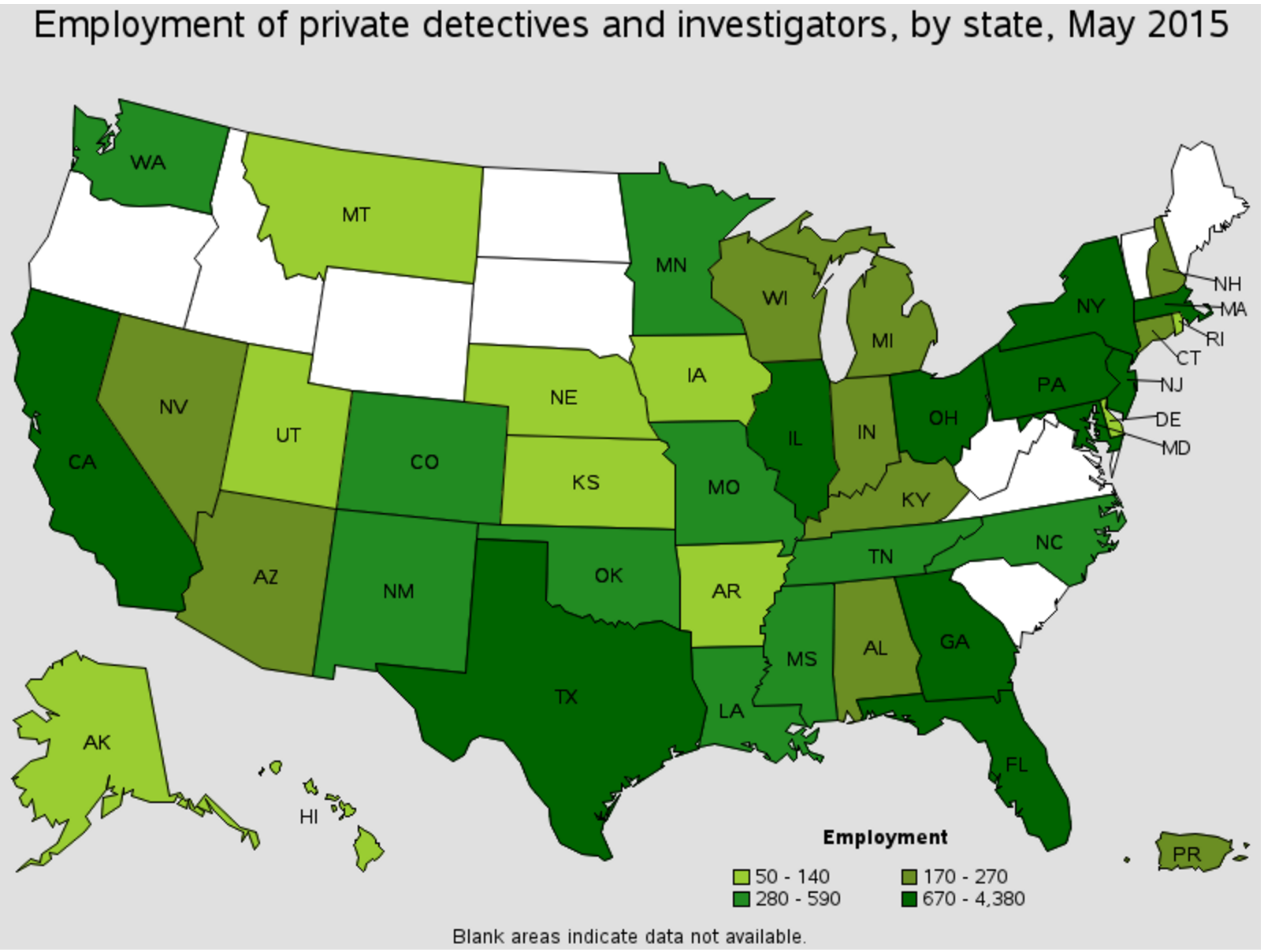Growing up watching detective serials and movies, everyone wants to become a detective. The thrill of deducing never really leaves us especially after getting to know the character of Sherlock Holmes. But this dream seems to be forgotten and we will work to more realistic goals. Since crime rate is increasing these days, more detectives are needed in order to solve them. This is where some police officers step up and exhibit the Sherlock Holmes in them. For those of you who still haven’t given up on your detective dreams, here is some information on the exciting career of being a detective.


Table Of Contents
- Average Detective Salary
- Detective Career Outlook
- How To Become A Detective
- Detective Job Description
How Much a Detective Earns
The employer is the one who will decide regarding the detective’s salary. An investigator who is employed by the state earns more than a private one in most cases. This is because a private detective has intermittent work while the state employed has a steady work. The national average for a state-employed detective is $76,000. For a private detective, he or she can earn about $45,000. Later, you will know about what affects a PI’s salary. Let’s take a look at the factors affecting a state employed investigators’ salary at the moment.
[asd_program_button /]Number of People
The income of a detective depends on the population of a city the same to that of the police officers. A more populated city will mean more cases to be handled. In this case, the salary will increase. Similarly, crime rate also plays a major factor in deciding the salary of an investigator. For example, the average salary for someone in the LA police department ranges from $44,000 to $88,000. In contrast, for someone in Miami Police department, the average salary tends to be around $86,000 to $107,000.

Place assigned or working
The location is closely related to the population of the place and the crime rate. However, another factor comes into play in such conditions – cost of living. Higher the cost of living in a certain location, higher the detective is paid. This logic agrees with the case of private investigators too. A pay of $116,00 is usually received by employees in District of Columbia, Alaska and New Jersey.
Level of education attained
One can have a police job if he or she has a high school degree except at the federal level. States have different rules but a higher education certificate is not necessary in some states. However, some states and departments have started to realize the importance of higher education and thus are paying officers and detectives a percentage higher above the base pay if they have a degree after high school. This can be an associate, bachelor or a master’s degree. Your degree will affect your salary.
Experience
Like any other job, you will get earn as an investigator if you stay in the field long enough. Usually, people see an increase of up to $15,000 with 20 years of experience if they do not get promoted. But if you are promoted as a Police Chief, you will be paid about $180,000 per year.
Plymouth Private Investigators
The salary of a private investigator depends on the how many cases he or she takes and solves them. The factors that affect the salary as mentioned above include the location, amount of discretion needed, amount of danger involved, required extra equipment and other many things. Clients usually present their problem to the investigator and then it is up to them to quote a price for the job.

As you can see, the income of a state-employed detective is steady and can be increased by various means. On the other hand, a private investigator’s salary is quite unpredictable and will only increase if he or she is already popular or known. Now that you have the financial facts, you can decide which path to choose.
Plymouth Detective Career Outlook
First thing first, we will be talking about career growth in this field. In 2015, the recorded public detectives or criminals investigators are about 106,000. On the other hand, there were only about 30,000 private investigators holding a job at the same time. Private detectives have grown for about 5% in the industry. Meaning to say, in 2025 the new jobs open will reach 1,500. This is the same growth rate of 5% in different sectors. This figure is only 4% for public investigators. This goes to show that 4,000 more jobs as a criminal investigator is expected in 2025. This is also considered as the average growth rate.
[asd_program_button /]The steady increase in employment is mainly due to the increase in population. As the population increases, more people need to be protected and more criminals need to be caught. But due to the strict implementation of laws and technology are more advanced, the crime rate is not increasing that much. Thus, both the phenomena almost balance each other out leading to an average growth in both these careers.

In terms of location, Texas, California and New York have the highest number of Criminal/Law Enforcement Investigators. Western states and Texas show more employment here than the eastern ones. Private detectives are prominent in California, Texas and Florida with the southern states tending to employ more compared to the northern ones.
Let’s see what are the industries that hire these professionals most. The Local, State government and the Federal branch are employing a lot of criminal investigators. Security Services, Consulting services are the ones who usually hire private detectives and the local government need them for consultation on a few cases.
When it comes to finance, criminal investigators are paid more compared to the private ones. Their annual average salary is $80,000 (Criminal investigators) and that of Private investigators is around $52,000. When combining the aspects of geography and finance, the District of Columbia, Alaska, and New Jersey is paying most the Public investigators. It is in Alabama, Nebraska, and New Jersey were private detectives are paid most.
Private industries that employ most do not pay the highest in comparison with the different industires. In fact, Electromedical, Navigational, Power generation, Metal Product forming and other such industries paid the most for private detectives since they had the most sensitive information to protect. For public investigators, they are paid most by federal agencies, postal services, and educational institutes.

Qualifications to Become a Plymouth Detective
It is important to note that there are two kinds of detectives. Some of them are private investigators who can be hired by the general public to investigate on certain things. Some of them are employed by the government and get this post after their promotion as a police officer. We are going to explore here the different avenues.
[asd_program_button /]Be a High School Graduate
A detective is known for his deduction skills, and it is due to such that he is promoted to such position. Hence if you want to become a detective, it is generally necessary to graduate from high school and enlist in the police force. Becoming a private investigator would mean getting a high school degree.
Earn a Bachelor’s degree
A bachelor’s degree isn’t really necessary in most cases when becoming a police officer. Although some officers would like to have other means of employment right after retirement. However, if you aspire to be a detective or land a job on federal level, you will need a bachelor’s degree.
Many institutions require applicants to have a bachelor’s degree in law, criminal justice or psychology to become a detective. If you have an associate’s degree, you will need at least 5000 hours. On the other hand, someone with a bachelor’s degree needs only 4000 hours of training.
Gain experience
Professional experience as an investigator is required in order to become a professional detective. Fortunately, you have several options available. But in most cases, it will require you to be employed by the government. Landing work as a law enforcement investigator, arson investigator, or criminal investigator will count as being a person with experience. Working as an office investigator or as a licensed repossessor will count as well.
There might be variations in the required experience in the state you’re applying in. A state might require at least 3 years of experience, but in some it could be as long as 5 years.
Own a gun legally
Investigators that aren’t licensed by the state aren’t allowed to carry firearms without a permit. There are several firearms with strict requirements such as completing a full training course before the permits are issued. Therefore if you want to own a firearm while working as an investigator, completing the training course is necessary to get your own permit.
Undergo a New Hampshire licensing test
A licensure test is required after you have all the requirements needed. During the exam, you will need to answer questions in multiple choice, usually regarding about state laws and several other procedures. The test is only available for those who want to be private detectives. Once you pass, you will officially become a licensed private detective.
File for New Hampshire insurance
Being a detective is dangerous, hence it is a good idea to get your insurance. Typically, we’re talking about a $10,000 medical insurance. However, getting an even higher amount when you bring a firearm is necessary since you need to have some protection with you.
Complete all these steps and then voila! You can now start living the detective life you always wanted. However, don’t forget that being a detective would mean exposing yourself to danger. If you are still up for it, find out all the education requirements in detail and get started on them right away!
What Does A Detective Do In Plymouth?
Crime Scene Investigation
It will be a detective’s duty to carefully assess a crime scene and come up with the most sensible deduction. He will then collect any evidence he can find in the crime scene. Supposedly, they should collect anything that looks like an evidence which can be used in court hearings later. To help them deduce a lot of things more quickly and easily, the forensic department will sometimes offer them assistance. They are also supposed to go door to door and gather more evidence from eye witnesses or search for cameras wherever they might be installed.
[asd_program_button /]Criminal Research
Doing research regarding previous cases is regarded as an important aspect of a detective’s job. This is so that they can have an insight regarding criminal patterns and behaviors. This involves looking into previous case records to allow them to have an insight regarding the behavior of the criminal. In cases of serial killers or ‘copycats’, research helps a lot. It also helps to identify tactics that a drug cartel might be using thus helping the detectives shut them down. Research also helps detectives make deductions more efficiently.
Accurately guessing the culprit
A detective’s main objective is to take the one at fault to justice. They will need to have a list of the suspects first before such thing could happen. In some cases, it could include over a hundred people, but there are also cases where there is none. They are able to come up with such list by piecing evidences, statements from eye witnesses, results from research, and a bit of forensics altogether. This suspect pool is then narrowed down by getting alibis from some suspects and interrogating others. With a narrowed down list, they will then have the suspects admit to their crimes.
Testifying In Court
As part of their final job, detectives will need to make sure justice is served. To hasten the process, the court will sometimes summon them. In some cases, they will describe the evidence and how they are connected to the suspect, as well as narrating the possible crime scene. In some cases, they will even accompany the culprit to the jail.
Plymouth Private Detectives
Basically, the above mentioned roles are the responsibilities that detectives carry. Keep in mind that the job of a private detective isn’t as easy as it seems. They are supposed to carry out their client’s wishes to the best of their abilities as far as reconnaissance is concerned. But there are limits which they shouldn’t go beyond when carrying out their duties. Some of the reasons why private detectives are hired include doing background checks, tracking finances, and even collecting clues and evidence to be used against a certain person. When carrying out duties as a detective, they should make sure not to look suspicious and act like a normal citizen. Detectives are also prohibited from arresting an individual.
As you can see, the “Idiot Box” was right for the most part. But the jobs that these detectives (private and public) must undergo daily are stressful beyond comparison. Such things aren’t even shown on the TV. They are always supposed to look over their shoulder and ensure they do not miss any single clue since lives literally depend on them. If you think being a detective is the right job for you, then you should do research about it now!
